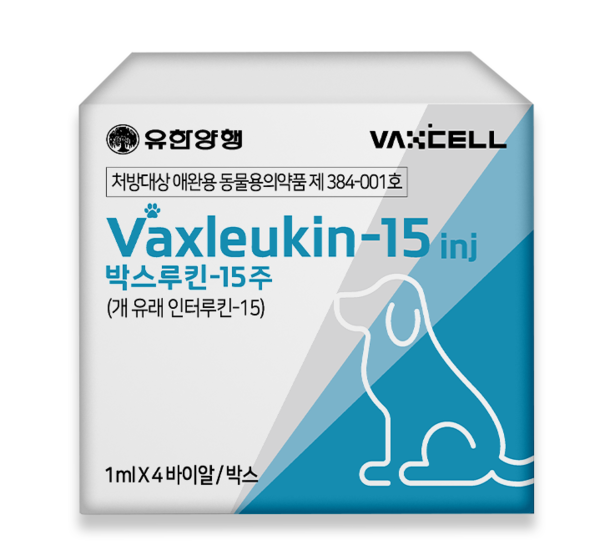Vaxcellbio has unveiled new clinical trial results backing its recombinant canine interleukin-15, or rcIL-15, as an add-on treatment for dogs with lymphoma.
Published last Friday in Frontiers in Veterinary Science, the study showed that Vaxleukin-15, the Korean company’s rcIL-15 candidate, significantly improved tumor response and disease control when added to standard CHOP-based chemotherapy, a multi-agent regimen commonly used for lymphoma in humans and animals.
The 12-week randomized study enrolled 61 newly diagnosed, treatment-naïve dogs at 23 veterinary hospitals in Korea. Thirty-seven dogs completed the protocol and were included in the final analysis.
Dogs treated with Vaxleukin-15 plus chemotherapy achieved an overall response rate (ORR) of 77.8 percent, compared to 57.9 percent in the control group receiving chemotherapy alone. Disease progression occurred in 16.7 percent of the treatment group vs. 31.6 percent in the control group.

“Currently, there are no approved immune-oncology drugs specifically indicated for canine lymphoma anywhere in the world,” Vaxcellbio CEO Lee Je-jung said Wednesday. He noted that Vaxleukin-15 could become the first globally available immunotherapy for this indication if approved. The company is also pursuing label expansion for feline lymphoma.
Biomarker trends reinforced the clinical outcomes. TK-1, a tumor proliferation marker, fell significantly by week 8 in the Vaxleukin-15 group (p < 0.0001). LDH levels also dropped in the treatment group but rose in controls, with a statistically significant difference at week 12 (p = 0.005). β2-microglobulin, a prognostic indicator in lymphoma, remained lower in treated dogs at weeks 8 (p = 0.048) and 12 (p = 0.031).
IFN-γ levels remained stable, indicating immune activation without overstimulation. Safety labs, including complete blood counts and liver and kidney panels, showed no major safety concerns. Most adverse events were mild and manageable, with gastrointestinal symptoms the most commonly reported.
Vaxleukin-15 was administered intravenously at 20 micrograms per kilogram daily, following prior dose-optimization studies in healthy dogs. The drug was manufactured in-house by Vaxcellbio using an E. coli-based recombinant protein expression system and was given in combination with a modified CHOP protocol.
Based on owner-reported questionnaires, quality-of-life scores showed significant improvements in appetite, activity, and general well-being in dogs receiving the combination therapy.
Vaxleukin-15 has won approval in Korea for treating canine mammary tumors. The drug is marketed through Yuhan Corp. “With the global rise in companion animal populations, we expect growing demand for Vaxleukin-15 beyond Korea,” CEO Lee said.
The company is looking beyond animal health.
Vaxcellbio is advancing a preclinical pipeline in human oncology led by its CAR-MIL platform. The technology, short for chimeric antigen receptor marrow-infiltrating lymphocytes, is being developed for multiple myeloma. The candidate is designed to overcome the limitations of current CAR-T therapies by targeting resistant tumor environments in the bone marrow.
Related articles
- Vaxcellbio wins nod for cell processing facility, paving way for 'Korea's 1st' regenerative heart failure trial
- Vaxcell-Bio to launch Korea’s 1st immunotherapy for pets with mammary tumor
- VaxCell-Bio secures advanced biopharmaceutical manufacturing license in Korea
- VaxCell-Bio to merge with ALBIOTEK, expanding cancer immunotherapy pipeline
- Yuhan to co-promote VaxCell-Bio’s pet immunotherapy
- Korea lags behind global standards in kidney cancer treatment, expert warns
- Vaxcellbio clears final regulatory hurdle to launch full-scale cell therapy CDMO
- Vaxcellbio wins grant for CAR-MIL as BMS, J&J face Korea roadblocks
- Vaxcellbio wins ₩8.6 bil. grant to develop next-gen CAR-NK cell therapy for solid tumors
- Vaxcellbio wins hospital project for dual-target CAR-T clinical research
- Korea clears Vaxcellbio’s Vaxleukin-15 as chemo add-on for canine lymphoma

